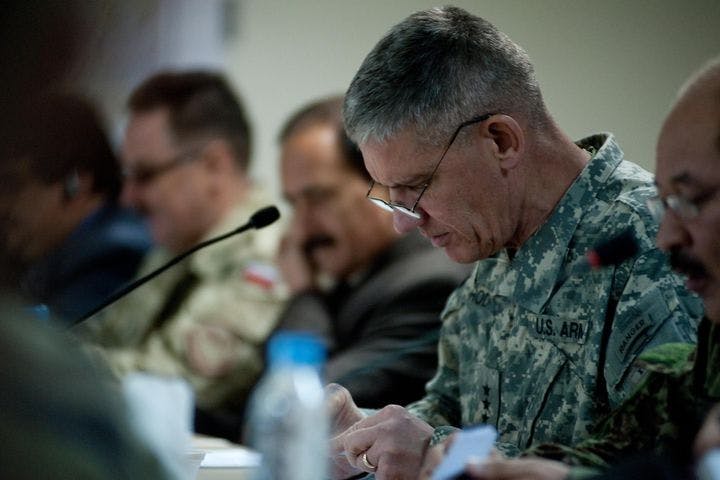Summer 2009
Winging It
– The Wilson Quarterly
General David Petraeus's views on the importance of higher education don't seem to have penetrated the leadership of the Air Force.
Gen. David Petraeus may be a towering figure to Army, Navy, and Marine Corps brass, but the Ph.D.-packing general’s views on the importance of higher education don’t seem to have penetrated the leadership of the Air Force, writes Tom Ruby, an Air Force colonel. The nation’s youngest military service has developed a culture of anti-intellectualism.
An Air Force general spelled it out to faculty at a service academy in 2007: Nothing is more important than “deploying,” the unnamed general announced, “certainly nothing we do here.” That view has consequences for the service’s best officers, warns Ruby, who is on the Headquarters Air Force staff and has served in combat and staff positions around the world. In recent promotion boards, officers who had taken time off to earn a doctorate fared poorly in comparison with those who hadn’t.
Experience is valuable but can be a “wasting asset” in the rapidly changing conditions of combat. Just because airpower worked in a particular way once doesn’t mean it will work the same way again, Ruby says. “Misapplying experience is perhaps the surest route to failure.”
Only 1.3 percent of the Air Force’s officer corps holds doctoral degrees, and many of them are in the hard sciences, critical to research and development. This leaves a paucity of top officials with degrees in other areas. And the Air Force doesn’t send enough of its best-educated officers into the field to raise the intellectual bar, nor does it send its most promotable and command-ready officers to teach at its staff and war colleges. “The Air Force places a greater value on a major who is about to graduate from a service school than on a lieutenant colonel graduate of the same school who stayed on as a faculty member,” Ruby says. The service sees the major as “potential,” the lieutenant colonel as someone who missed the boat.
The capacity for conceptualization that, ideally, is enhanced by higher education allows officers to deal with future threats outside the framework of their own experiences. During World War II, 31 of 35 U.S. Army corps commanders had taught at the service schools. Sophisticated military education helped them analyze the complexities they faced without relying solely on heroic leadership or experience, of which they had little to prepare them for such a conflict.
“They won a massive, two-front war in less than four years from a standing start,” Ruby says. “You don’t need a Ph.D. to see the lesson in that.”
THE SOURCE: "Flying High, Thinking Big" by Tom Ruby, The American Interest, May-June 2009.
Photo courtesy of the International Security Assistance Force
